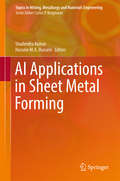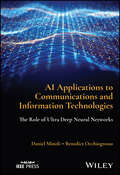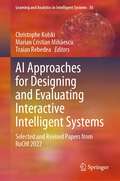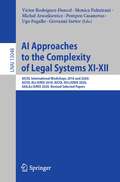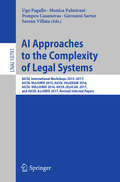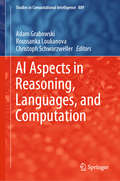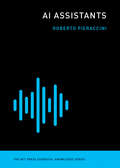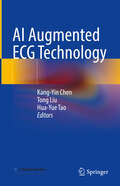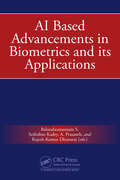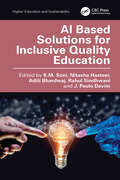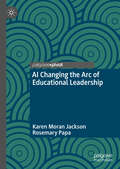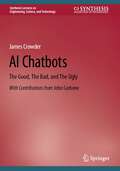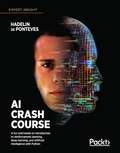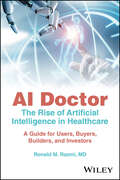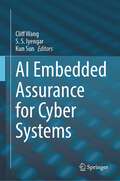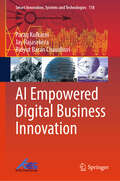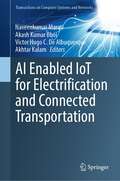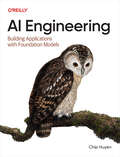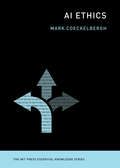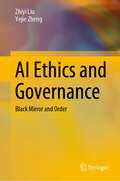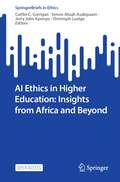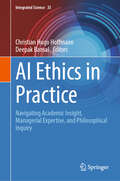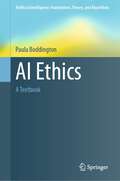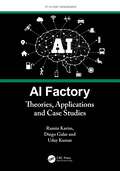- Table View
- List View
AI Applications in Sheet Metal Forming (Topics in Mining, Metallurgy and Materials Engineering)
by Shailendra Kumar Hussein M. A. HusseinThis book comprises chapters on research work done around the globe in the area of artificial intelligence (AI) applications in sheet metal forming. The first chapter offers an introduction to various AI techniques and sheet metal forming, while subsequent chapters describe traditional procedures/methods used in various sheet metal forming processes, and focus on the automation of those processes by means of AI techniques, such as KBS, ANN, GA, CBR, etc. Feature recognition and the manufacturability assessment of sheet metal parts, process planning, strip-layout design, selecting the type and size of die components, die modeling, and predicting die life are some of the most important aspects of sheet metal work. Traditionally, these activities are highly experience-based, tedious and time consuming. In response, researchers in several countries have applied various AI techniques to automate these activities, which are covered in this book. This book will be useful for engineers working in sheet metal industries, and will serve to provide future direction to young researchers and students working in the area.
AI Applications to Communications and Information Technologies: The Role of Ultra Deep Neural Networks
by Daniel Minoli Benedict OcchiogrossoAI Applications to Communications and Information Technologies Apply the technology of the future to networking and communications. Artificial intelligence, which enables computers or computer-controlled systems to perform tasks which ordinarily require human-like intelligence and decision-making, has revolutionized computing and digital industries like few other developments in recent history. Tools like artificial neural networks, large language models, and deep learning have quickly become integral aspects of modern life. With research and development into AI technologies proceeding at lightning speeds, the potential applications of these new technologies are all but limitless. AI Applications to Communications and Information Technologies offers a cutting-edge introduction to AI applications in one particular set of disciplines. Beginning with an overview of foundational concepts in AI, it then moves through numerous possible extensions of this technology into networking and telecommunications. The result is an essential introduction for researchers and for technology undergrad/grad student alike. AI Applications to Communications and Information Technologies readers will also find: In-depth analysis of both current and evolving applications Detailed discussion of topics including generative AI, chatbots, automatic speech recognition, image classification and recognition, IoT, smart buildings, network management, network security, and more An authorial team with immense experience in both research and industry AI Applications to Communications and Information Technologies is ideal for researchers, industry observers, investors, and advanced students of network communications and related fields.
AI Approaches for Designing and Evaluating Interactive Intelligent Systems: Selected and Revised Papers from RoCHI 2022 (Learning and Analytics in Intelligent Systems #36)
by Christophe Kolski Traian Rebedea Marian Cristian MihăescuDesigning, building, and evaluating Interactive and Intelligent Systems (IIS) has highly impacted the progress of Artificial Intelligence (AI) techniques due to advancements in the fields of Deep Learning (DL) and Natural Language Processing (NLP). This book presents in a structured way several practical use cases of the interplay between IIS and DL/NLP, from cognitive assistants, adaptive navigation systems, virtual reality, offensive comment and cyberbullying detection, 3D modelling, and driving behaviour detection. The convergence of AI and Human-Computer Interaction (HCI) has been proven to foster the IIS development that nowadays represents the most used context by actively integrating AI techniques in merely any layer of modern applications.The main goal of this book is to provide a practical reference with a rich set of approaches and applications consisting of selected and revised papers from the International Conference on Human-Computer Interaction (RoCHI) 2022 thatwas held on 6-7 October 2022 at the University of Craiova, Romania. The book addresses researchers and practitioners with experience in IIS and AI (mainly DL and NLP) who want to study successfully developed workflows and applications that may be useful in their attempts to tackle issues from their contexts.Although the book nicely integrates concepts from various areas, each chapter may be considered a standalone topic with its research issue, proposed approach, experimental results, and discussions.
AI Approaches to the Complexity of Legal Systems XI-XII: AICOL International Workshops 2018 and 2020: AICOL-XI@JURIX 2018, AICOL-XII@JURIX 2020, XAILA@JURIX 2020, Revised Selected Papers (Lecture Notes in Computer Science #13048)
by Ugo Pagallo Giovanni Sartor Michał Araszkiewicz Pompeu Casanovas Monica Palmirani Víctor Rodríguez-DoncelThis book includes revised selected papers from the International Workshops on AI Approaches to the Complexity of Legal Systems, AICOL-XI@JURIX2018, held in Groningen, The Netherlands, on December 12, 2018; AICOL-XII@JURIX 2020, held in Brno, Czechia, on December 9, 2020; XAILA@JURIX 2020, held in in Brno, Czechia, on December 9, 2020.*The 17 full and 4 short papers included in this volume were carefully reviewed and selected form 39 submissions. They represent a comprehensive picture of the state of the art in legal informatics. The papers are logically organized in 5 blocks: Knowledge Representation; Logic, rules, and reasoning; Explainable AI in Law and Ethics; Law as Web of linked Data and the Rule of Law; Data protection and Privacy Modelling and Reasoning.*Due to the Covid-19 pandemic AICOL-XII@JURIX 2020 and XAILA@JURIX 2020 were held virtually.
AI Approaches to the Complexity of Legal Systems: International Workshops Aicol-i/ivr-xxiv, Beijing, China, September 19, 2009 And Aicol-ii/jurix 2009, Rotterdam, The Netherlands, December 16, 2009 Revised Selected Papers (Lecture Notes in Computer Science #6237)
by Ugo Pagallo Giovanni Sartor Pompeu Casanovas Monica Palmirani Serena VillataThis book includes revised selected papers from five International Workshops on Artificial Intelligence Approaches to the Complexity of Legal Systems, AICOL VI to AICOL X, held during 2015-2017: AICOL VI in Braga, Portugal, in December 2015 as part of JURIX 2015; AICOL VII at EKAW 2016 in Bologna, Italy, in November 2016; AICOL VIII in Sophia Antipolis, France, in December 2016; AICOL IX at ICAIL 2017 in London, UK, in June 2017; and AICOL X as part of JURIX 2017 in Luxembourg, in December 2017.The 37 revised full papers included in this volume were carefully reviewed and selected form 69 submissions. They represent a comprehensive picture of the state of the art in legal informatics. The papers are organized in six main sections: legal philosophy, conceptual analysis, and epistemic approaches; rules and norms analysis and representation;legal vocabularies and natural language processing; legal ontologies and semantic annotation; legal argumentation; and courts, adjudication and dispute resolution.
AI Aspects in Reasoning, Languages, and Computation (Studies in Computational Intelligence #889)
by Roussanka Loukanova Adam Grabowski Christoph SchwarzwellerThis book builds on decades of research and provides contemporary theoretical foundations for practical applications to intelligent technologies and advances in artificial intelligence (AI). Reflecting the growing realization that computational models of human reasoning and interactions can be improved by integrating heterogeneous information resources and AI techniques, its ultimate goal is to promote integrated computational approaches to intelligent computerized systems. The book covers a range of interrelated topics, in particular, computational reasoning, language, syntax, semantics, memory, and context information. The respective chapters use and develop logically oriented methods and techniques, and the topics selected are from those areas of logic that contribute to AI and provide its mathematical foundations.The intended readership includes researchers working in the areas of traditional logical foundations, and on new approaches to intelligent computational systems.
AI Assistants (The MIT Press Essential Knowledge series)
by Roberto PieracciniAn accessible explanation of the technologies that enable such popular voice-interactive applications as Alexa, Siri, and Google Assistant.Have you talked to a machine lately? Asked Alexa to play a song, asked Siri to call a friend, asked Google Assistant to make a shopping list? This volume in the MIT Press Essential Knowledge series offers a nontechnical and accessible explanation of the technologies that enable these popular devices. Roberto Pieraccini, drawing on more than thirty years of experience at companies including Bell Labs, IBM, and Google, describes the developments in such fields as artificial intelligence, machine learning, speech recognition, and natural language understanding that allow us to outsource tasks to our ubiquitous virtual assistants. Pieraccini describes the software components that enable spoken communication between humans and computers, and explains why it's so difficult to build machines that understand humans. He explains speech recognition technology; problems in extracting meaning from utterances in order to execute a request; language and speech generation; the dialog manager module; and interactions with social assistants and robots. Finally, he considers the next big challenge in the development of virtual assistants: building in more intelligence--enabling them to do more than communicate in natural language and endowing them with the capacity to know us better, predict our needs more accurately, and perform complex tasks with ease.
AI Augmented ECG Technology
by Kang-Yin Chen Tong Liu Hua-Yue TaoThis book mainly focuses on the application of AI technology in the field of ECG, and details the theoretical, practical, and evidence-based aspects of this technology. It extensively reviews the latest research reports, and discusses the application of artificial intelligence in the diagnosis and treatment of cardiovascular diseases. This book focuses on the application of artificial intelligence in the diagnosis and treatment of cardiovascular diseases, and discusses in depth its clinical application in the diagnosis and treatment of coronary heart disease, heart failure, arrhythmia, cardiac pacing, hypertension, myocardial disease, heart valve disease, electrolyte disorders, and other diseases. It not only provides an overview of medical artificial intelligence but also richly demonstrates its clinical practice, which will help cardiovascular doctors, electrocardiogram diagnostic doctors, or medical students to understand the basic theories, applications, and development direction of this field.
AI Based Advancements in Biometrics and its Applications
by Seifedine Kadry Rajesh Kumar Dhanaraj A. Prasanth S BalasubramaniamThis book delves into the history of biometrics, the different systems that have been developed to date, problems that have arisen from these systems, the necessity of AI-based biometrics systems, different AI techniques developed to date (including machine learning, deep learning, natural language processing, and pattern recognition), their potential uses and applications, security and privacy issues in AI-based Biometric systems, current trends in AI-based biometrics, and presents case studies of AI-based biometrics.
AI Based Solutions for Inclusive Quality Education (Higher Education and Sustainability)
by J. Paulo Davim Rahul Sindhwani Nitasha Hasteer Aditi Bhardwaj K. M. SoniAI Based Solutions for Inclusive Quality Education helps readers discover practical AI tools for diverse learning styles and abilities, fostering inclusivity in education and maximizing the individual potential of students and educators. It provides cutting-edge solutions designed to remove barriers due to accessibility and create an equitable classroom. Through practical applications and case studies, the book explores the power of AI in creating personalized learning pathways and methods of engagement in the classroom while emphasizing that the human touch, with empathy and critical thinking, remains central to the learning process. It addresses concerns about the ethical development and deployment of AI in education.Features Discusses a topic that is at the forefront of concerns in the education sector with the disruptive impact of advances in AI. Provides explanations for specific AI platforms and tools, along with their features and applications in education. Includes case studies and discusses inclusivity and the lessons learned from each AI application. Explains how to ethically handle bias, privacy and transparency in AI-based solutions in education. Serves as a comprehensive guide for educators, policymakers and technology developers interested in the power of AI in educational environments. This book serves as a timely reference in the current era of AI tools and education. It is written for those who work in the education sector, as well as researchers, academicians, undergraduate and graduate students, those involved with undergraduate teaching in critical thinking and problem-solving for information systems, information technology, computer science and engineering and all teaching institutions where AI tools have been or will be introduced.
AI Changing the Arc of Educational Leadership
by Rosemary Papa Karen Moran JacksonAs artificial intelligence becomes an all-encompassing issue in education and beyond, this book seeks to answer how it will change the arc of educational leadership in K-12 schooling. Educators and leaders serve as the champions and gatekeepers of technology use in schools. They need to consider how AI can change education for the better while keeping in mind cultural, social, and emotional concerns that cannot be isolated from educational settings. Jackson and Papa examine existing literature and include insightful interviews with professionals in AI and education to understand how educators currently perceive and use AI. They also illustrate the similarities and differences in how educators and A.I.ED developers envision AI's present and future.
AI Chatbots: The Good, The Bad, and The Ugly (Synthesis Lectures on Engineering, Science, and Technology)
by James CrowderThis book explores the subject of artificial psychology from the standpoint of how online Chatbots have infiltrated and affected societies and the world in general. The book explores the psychological effects of depending on an online entity for our needs – even if it’s a reminder of scheduled events. The author provides insight into the notion of human-Chatbot exchanges, understanding, and false emotions both from the Chatbot and from the human. He goes on to investigate and discuss the dangers of too much reliance on technology that learns from a variety of sources and how some sources can negatively influence Chatbots, and by doing so, negatively affect people. The book also discusses human-Chatbot interactions and the natural language interface(s) required to respond adequately to humans. Lastly, the author explores the notion of ethical considerations for people, based on their interactions with Chatbots, including information based on cultural differences between different regions of the world.
AI Crash Course: A fun and hands-on introduction to machine learning, reinforcement learning, deep learning, and artificial intelligence with Python
by Hadelin de PontevesIf you want to add AI to your skillset, this book is for you. It doesn’t require data science or machine learning knowledge. Just maths basics (high school level).
AI Doctor: The Rise of Artificial Intelligence in Healthcare - A Guide for Users, Buyers, Builders, and Investors
by Ronald M. RazmiExplores the transformative impact of artificial intelligence (AI) on the healthcare industry AI Doctor: The Rise of Artificial Intelligence in Healthcare provides a timely and authoritative overview of the current impact and future potential of AI technology in healthcare. With a reader-friendly narrative style, this comprehensive guide traces the evolution of AI in healthcare, describes methodological breakthroughs, drivers and barriers of its adoption, discusses use cases across clinical medicine, administration and operations, and life sciences, and examines the business models for the entrepreneurs, investors, and customers. Detailed yet accessible chapters help those in the business and practice of healthcare recognize the remarkable potential of AI in areas such as drug discovery and development, diagnostics, therapeutics, clinical workflows, personalized medicine, early disease prediction, population health management, and healthcare administration and operations. Throughout the text, author Ronald M. Razmi, MD offers valuable insights on harnessing AI to improve health of the world population, develop more efficient business models, accelerate long-term economic growth, and optimize healthcare budgets. Addressing the potential impact of AI on the clinical practice of medicine, the business of healthcare, and opportunities for investors, AI Doctor: The Rise of Artificial Intelligence in Healthcare: Discusses what AI is currently doing in healthcare and its direction in the next decade Examines the development and challenges for medical algorithms Identifies the applications of AI in diagnostics, therapeutics, population health, clinical workflows, administration and operations, discovery and development of new clinical paradigms and more Presents timely and relevant information on rapidly expanding generative AI technologies, such as Chat GPT Describes the analysis that needs to be made by entrepreneurs and investors as they evaluate building or investing in health AI solutions Features a wealth of relatable real-world examples that bring technical concepts to life Explains the role of AI in the development of vaccines, diagnostics, and therapeutics during the COVID-19 pandemic AI Doctor: The Rise of Artificial Intelligence in Healthcare. A Guide for Users, Buyers, Builders, and Investors is a must-read for healthcare professionals, researchers, investors, entrepreneurs, medical and nursing students, and those building or designing systems for the commercial marketplace. The book's non-technical and reader-friendly narrative style also makes it an ideal read for everyone interested in learning about how AI will improve health and healthcare in the coming decades.
AI Embedded Assurance for Cyber Systems
by Cliff Wang S. S. Iyengar Kun SunThe rapid growth and reliance on cyber systems have permeated our society, government, and military which is demonstrated in this book. The authors discuss how AI-powered cyber systems are designed to protect against cyber threats and ensure the security and reliability of digital systems using artificial intelligence (AI) technologies. As AI becomes more integrated into various aspects of our lives, the need for reliable and trustworthy AI systems becomes increasingly important. This book is an introduction to all of the above-mentioned areas in the context of AI Embedded Assurance for Cyber Systems.This book has three themes. First, the AI/ML for digital forensics theme focuses on developing AI and ML powered forensic tools, techniques, software, and hardware. Second, the AI/ML for cyber physical system theme describes that AI/ML plays an enabling role to boost the development of cyber physical systems (CPS), especially in strengthening the security and privacy of CPS. Third, the AI/ML for cyber analysis theme focuses on using AI/ML to analyze tons of data in a timely manner and identify many complex threat patterns. This book is designed for undergraduates, graduate students in computer science and researchers in an interdisciplinary area of cyber forensics and AI embedded security applications. It is also useful for practitioners who would like to adopt AIs to solve cyber security problems.
AI Empowered Digital Business Innovation (Smart Innovation, Systems and Technologies #118)
by Parag Kulkarni Jay Rajasekera Bidyut Baran ChaudhuriDigital business innovation is not simply about using new technologies and upgrading business plans but about upgrading your strategic thinking and embedding AI in the thought process. This book covers digital technologies and the strategic landscape of digital entrepreneurship. It elaborates how AI advances converge to create new learning and business opportunities. It includes digital business innovation technologies, AI strategies for businesses, and learning and collaborative learning strategies. Digital business innovation empowers business or changes the paradigm of business and at times redefines it with intelligent technologies. This in turn helps organizations and businesses create better value for customers and address problems that were not possible to address in the past. Digital business innovation can be approached at three levels to increase contextual participation. It includes focused business innovation, strategic AI innovation, and intelligent implementation. The book contains real-life stories of digital business innovation from companies in countries such as Japan, the USA, India, and Singapore. The authors have contributed and witnessed these technological innovations, and hence bring first-hand experience to help readers participate in this journey. It is the journey to create new success stories through AI research that empowers business transformation.
AI Enabled IoT for Electrification and Connected Transportation (Transactions on Computer Systems and Networks)
by Akash Kumar Bhoi Akhtar Kalam Naveenkumar Marati Victor Hugo C. De AlbuquerqueThis book presents an overview of artificial intelligence (AI) in the automotive section, especially in the modern era of green energy-based electrification of vehicles and smart transportation systems. The book also discusses different Internet of Things aspects involved in the automotive domain with AI. The book presents autonomous driving systems, advanced driver assistance systems (ADAS), autonomy, AI involvement, and machine learning techniques with challenges in electrification, prognostics, and diagnostics. AI and IoT are two emerging technologies, and their importance in other modern technology electrification on transportation, connected vehicle segment are discussed thoroughly in this book with different topologies. It also presents AI applications in the charging profile prediction, state of charge, state of health, battery lifetime, and battery temperature detection in dynamic conditions. Different algorithms are also given in the book to discuss the nearest point charging station for electric vehicle users. The book also discusses cybersecurity issues and challenges in the real-time environment for AI implementation, IoT in transportation, and autonomous driving. The other aspects of telematics, smart sensors for the implementation of the IoT, and AI are also discussed, especially in guidance and control aspects. The book will be useful for the researchers, practitioners, and industry people working in AI, IoT in the electrification and transportation segment.
AI Engineering: Building Applications with Foundation Models
by Chip HuyenRecent breakthroughs in AI have not only increased demand for AI products, they've also lowered the barriers to entry for those who want to build AI products. The model-as-a-service approach has transformed AI from an esoteric discipline into a powerful development tool that anyone can use. Everyone, including those with minimal or no prior AI experience, can now leverage AI models to build applications. In this book, author Chip Huyen discusses AI engineering: the process of building applications with readily available foundation models.The book starts with an overview of AI engineering, explaining how it differs from traditional ML engineering and discussing the new AI stack. The more AI is used, the more opportunities there are for catastrophic failures, and therefore, the more important evaluation becomes. This book discusses different approaches to evaluating open-ended models, including the rapidly growing AI-as-a-judge approach.AI application developers will discover how to navigate the AI landscape, including models, datasets, evaluation benchmarks, and the seemingly infinite number of use cases and application patterns. You'll learn a framework for developing an AI application, starting with simple techniques and progressing toward more sophisticated methods, and discover how to efficiently deploy these applications.Understand what AI engineering is and how it differs from traditional machine learning engineeringLearn the process for developing an AI application, the challenges at each step, and approaches to address themExplore various model adaptation techniques, including prompt engineering, RAG, fine-tuning, agents, and dataset engineering, and understand how and why they workExamine the bottlenecks for latency and cost when serving foundation models and learn how to overcome themChoose the right model, dataset, evaluation benchmarks, and metrics for your needsChip Huyen works to accelerate data analytics on GPUs at Voltron Data. Previously, she was with Snorkel AI and NVIDIA, founded an AI infrastructure startup, and taught Machine Learning Systems Design at Stanford. She's the author of the book Designing Machine Learning Systems, an Amazon bestseller in AI.AI Engineering builds upon and is complementary to Designing Machine Learning Systems (O'Reilly).
AI Essentials Guide: Principles for Navigating the Next Tech Renaissance
by William HawkinsThis is a comprehensive exploration into the world of Artificial Intelligence, designed to bridge the gap between theoretical concepts and practical, real-world applications. This book unravels the mystique of AI, breaking down its components into understandable elements. From the early dawn of AI's inception to its current state of rapid evolution, we cover the essential building blocks necessary for leveraging AI in business, and personal development, and understanding its broader impacts on society. Through an engaging conversational format, readers are guided through the intricacies of AI, covering topics such as machine learning, AI governance,, data security, and the ethical challenges facing AI today. This book is an invaluable resource for those looking to understand the fundamentals of AI, its practical applications, and its significant implications for the future. After reading this book, you will be able to integrate AI into your business strategies and learn the intricacies of AI advancements. What You Will Learn: Key concepts and definitions within AI, including types of AI, machine learning, and neural networks and how they are utilized in AI apps like M365 Copilot Practical applications of AI for personal and business growth, focusing on the pillars of using AI to evolve these fronts effectively and sustainably How AI is transforming businesses and what organizational shifts must be made to realize the value Navigating the challenges and ethical considerations in AI to ensure informed and responsible usage Who This Book Is For: Professionals looking to integrate AI into their business strategies or organizations.
AI Ethics (The MIT Press Essential Knowledge series)
by Mark CoeckelberghAn accessible synthesis of ethical issues raised by artificial intelligence that moves beyond hype and nightmare scenarios to address concrete questions.Artificial intelligence powers Google's search engine, enables Facebook to target advertising, and allows Alexa and Siri to do their jobs. AI is also behind self-driving cars, predictive policing, and autonomous weapons that can kill without human intervention. These and other AI applications raise complex ethical issues that are the subject of ongoing debate. This volume in the MIT Press Essential Knowledge series offers an accessible synthesis of these issues. Written by a philosopher of technology, AI Ethics goes beyond the usual hype and nightmare scenarios to address concrete questions.Mark Coeckelbergh describes influential AI narratives, ranging from Frankenstein's monster to transhumanism and the technological singularity. He surveys relevant philosophical discussions: questions about the fundamental differences between humans and machines and debates over the moral status of AI. He explains the technology of AI, describing different approaches and focusing on machine learning and data science. He offers an overview of important ethical issues, including privacy concerns, responsibility and the delegation of decision making, transparency, and bias as it arises at all stages of data science processes. He also considers the future of work in an AI economy. Finally, he analyzes a range of policy proposals and discusses challenges for policymakers. He argues for ethical practices that embed values in design, translate democratic values into practices and include a vision of the good life and the good society.
AI Ethics and Governance: Black Mirror and Order
by Zhiyi Liu Yejie ZhengThis book deeply analyzes the theoretical roots of the development of global artificial intelligence ethics and AI governance, the ethical issues in AI application scenarios, and the discussion of artificial intelligence governance issues from a global perspective. From the perspective of knowledge, the book includes not only the metaphysical research of traditional Western ethics, but also the interpretation of AI-related practical cases and international policies. The purpose of this book is not only to study AI ethics and governance issues academically, but to seek a path to solve problems in the real world. It is a very meaningful monograph in both academic theory and reality. This book responds to the implementation of China's digital economy governance and other topics. It is a cutting-edge academic monograph that combines industry, policy, and thought.In this book, the author not only discusses the humanities thoughts such as ethics, political economy, philosophy, and sociology, but also involves computer science, biology, and medicine and other science and engineering disciplines, effectively using interdisciplinary thinking as readers clarify how to explore ethical consensus and establish smart social governance rules in the era of artificial intelligence, so as to provide the most comprehensive and unique scientific and technological insights for smart economy participants, related practitioners in the artificial intelligence industry, and government policy makers. For academia, this is a representative book of Chinese scholars' systematic thinking on AI ethical propositions from a global perspective. For the industry, this is a book that understands the policies and ethical propositions faced by the development of AI industry. An important reference book, for policy makers, this is a monograph for understanding how policies in the AI industry make decisions that conform to AI industry practices and people's moral order.
AI Ethics in Higher Education: Insights from Africa and Beyond (SpringerBriefs in Ethics)
by Christoph Luetge Caitlin C. Corrigan Simon Atuah Asakipaam Jerry John KponyoThis open access book tackles the pressing problem of integrating concerns related to Artificial Intelligence (AI) ethics into higher education curriculums aimed at future AI developers in Africa and beyond. For doing so, it analyzes the present and future states of AI ethics education in local computer science and engineering programs. The authors share relevant best practices and use cases for teaching, develop answers to ongoing organizational challenges, and reflect on the practical implications of different theoretical approaches to AI ethics. The book is of great interest to faculty members, researchers, and students in the fields of artificial intelligence, computer science, mathematics, computer engineering, and related areas, as well as higher education administration.
AI Ethics in Practice: Navigating Academic Insight, Managerial Expertise, and Philosophical Inquiry (Integrated Science #35)
by Christian Hugo Hoffmann Deepak BansalThis book takes us on an in-depth exploration of the evolving intersection between artificial intelligence and ethical considerations. As AI applications extend far beyond technology giants, a robust ethical debate unfolds, addressing issues of discrimination, democracy, and due process. Tech startups, often lacking corporate governance and legal expertise, become central figures in this narrative, facing unique uncertainties. Grounded in applied ethics, this collaborative work between experts from practice and academia investigates responsible tech entrepreneurship, also helping lay practical foundations for startups. Providing diagnostic tools and frameworks, the book is tailored for academics, researchers, and professionals navigating the ethical dimensions of AI in organizational settings. Going beyond managerial insights, the narrative takes a philosophical turn, contemplating not just the capabilities but the ethical responsibilities of AI. Rooted in effective altruism and conceptual analyses, this book serves as a critical resource for those seeking informed, ethical decision-making in the rapidly evolving technological landscape.
AI Ethics: A Textbook (Artificial Intelligence: Foundations, Theory, and Algorithms)
by Paula BoddingtonThis book introduces readers to critical ethical concerns in the development and use of artificial intelligence. Offering clear and accessible information on central concepts and debates in AI ethics, it explores how related problems are now forcing us to address fundamental, age-old questions about human life, value, and meaning. In addition, the book shows how foundational and theoretical issues relate to concrete controversies, with an emphasis on understanding how ethical questions play out in practice. All topics are explored in depth, with clear explanations of relevant debates in ethics and philosophy, drawing on both historical and current sources. Questions in AI ethics are explored in the context of related issues in technology, regulation, society, religion, and culture, to help readers gain a nuanced understanding of the scope of AI ethics within broader debates and concerns. Written with both students and educators in mind, the book is easy to use, with key terms clearly explained, and numerous exercises designed to stretch and challenge. It offers readers essential insights into the evolving field of AI ethics. Moreover, it presents a range of methods and strategies that can be used to analyse and understand ethical questions, which are illustrated throughout with case studies.
AI Factory: Theories, Applications and Case Studies (ICT in Asset Management)
by Uday Kumar Diego Galar Ramin KarimThis book provides insights into how to approach and utilise data science tools, technologies, and methodologies related to artificial intelligence (AI) in industrial contexts. It explains the essence of distributed computing and AI technologies and their interconnections. It includes descriptions of various technology and methodology approaches and their purpose and benefits when developing AI solutions in industrial contexts. In addition, this book summarises experiences from AI technology deployment projects from several industrial sectors. Features: Presents a compendium of methodologies and technologies in industrial AI and digitalisation. Illustrates the sensor-to-actuation approach showing the complete cycle, which defines and differentiates AI and digitalisation. Covers a broad range of academic and industrial issues within the field of asset management. Discusses the impact of Industry 4.0 in other sectors. Includes a dedicated chapter on real-time case studies. This book is aimed at researchers and professionals in industrial and software engineering, network security, AI and machine learning (ML), engineering managers, operational and maintenance specialists, asset managers, and digital and AI manufacturing specialists.
